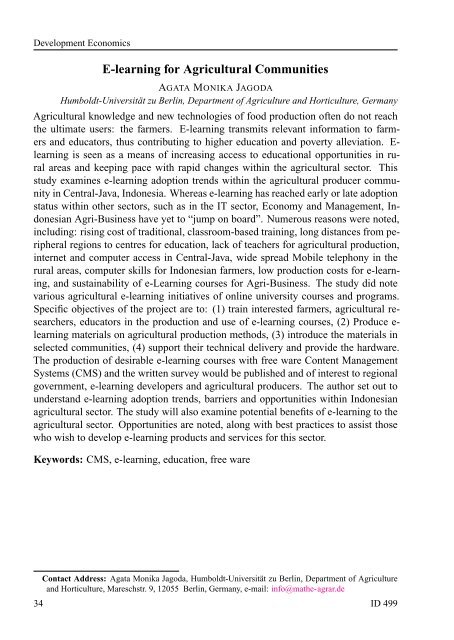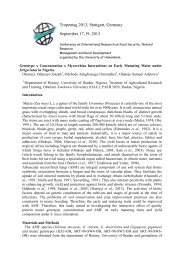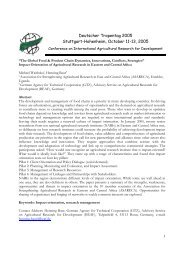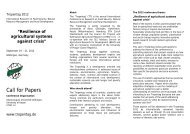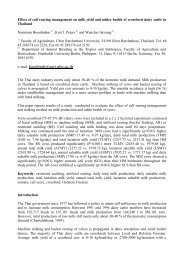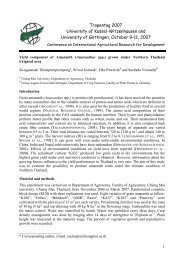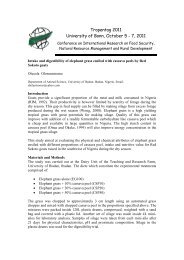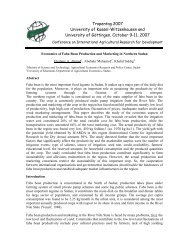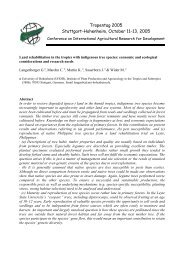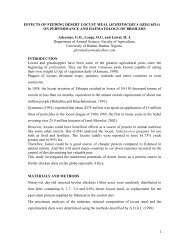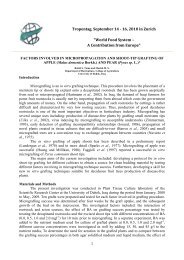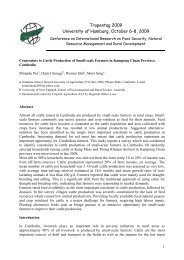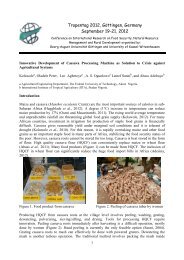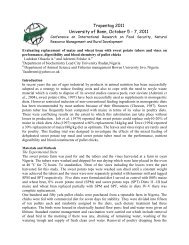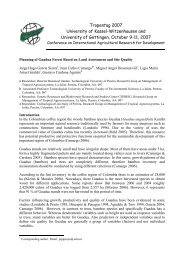- Page 1 and 2: Tropentag 2006 International Resear
- Page 3 and 4: Preface The TROPENTAG is the Intern
- Page 5 and 6: Contents Plenary Session 7 I Develo
- Page 7 and 8: Plenary Session 13:20 HANS VON GINK
- Page 9 and 10: Development Economics a) Markets, L
- Page 11 and 12: Markets, Liberalisation and Policie
- Page 13 and 14: Markets, Liberalisation and Policie
- Page 15 and 16: Markets, Liberalisation and Policie
- Page 17 and 18: Poverty reduction and Development r
- Page 19 and 20: Poverty reduction and Development r
- Page 21 and 22: Poverty reduction and Development r
- Page 23 and 24: Conflicts, Challenges and Diversifi
- Page 25 and 26: Conflicts, Challenges and Diversifi
- Page 27 and 28: Conflicts, Challenges and Diversifi
- Page 29 and 30: Livelihood, Education and Developme
- Page 31 and 32: Livelihood, Education and Developme
- Page 33: Livelihood, Education and Developme
- Page 37 and 38: Plants and Soils a) Plant Productio
- Page 39 and 40: Plant Production Systems WANWISA PA
- Page 41 and 42: Plant Production Systems The Functi
- Page 43 and 44: Plant Production Systems Germplasm
- Page 45 and 46: Plant Nutrition and Soils Invited P
- Page 47 and 48: Plant Nutrition and Soils Impact of
- Page 49 and 50: Plant Nutrition and Soils Soil Temp
- Page 51 and 52: Plant Nutrition and Soils Potassium
- Page 53 and 54: Organic Farming and Organic Compoun
- Page 55 and 56: Organic Farming and Organic Compoun
- Page 57 and 58: Organic Farming and Organic Compoun
- Page 59 and 60: Stresses and Biodiversity ABULEGASI
- Page 61 and 62: Stresses and Biodiversity Indicator
- Page 63 and 64: Stresses and Biodiversity Diversity
- Page 65 and 66: Production Systems and Environment
- Page 67 and 68: Regional Water Issues and Pollution
- Page 69 and 70: Regional Water Issues and Pollution
- Page 71 and 72: Regional Water Issues and Pollution
- Page 73 and 74: Farming Systems Management INGRID F
- Page 75 and 76: Farming Systems Management Banana I
- Page 77 and 78: Farming Systems Management Poverty
- Page 79 and 80: Farming Systems Management Valuatio
- Page 81 and 82: Social Ecology and Land Use REGINA
- Page 83 and 84: Social Ecology and Land Use Validit
- Page 85 and 86:
Social Ecology and Land Use Implica
- Page 87 and 88:
Regional Forest Issues ANNE FLOQUET
- Page 89 and 90:
Regional Forest Issues Scenarios of
- Page 91 and 92:
Regional Forest Issues Marketing Lo
- Page 93 and 94:
Animal Sciences a) Molecular Geneti
- Page 95 and 96:
Molecular Genetics and Biodiversity
- Page 97 and 98:
Molecular Genetics and Biodiversity
- Page 99 and 100:
Molecular Genetics and Biodiversity
- Page 101 and 102:
Animal Nutrition KARIN BARTL, MIRIA
- Page 103 and 104:
Animal Nutrition Improving Calf Per
- Page 105 and 106:
Effect of Variety, Harvesting Stage
- Page 107 and 108:
Animal Production Systems MARIANA R
- Page 109 and 110:
Animal Production Systems Determina
- Page 111 and 112:
Animal Production Systems Character
- Page 113 and 114:
GIS, Modeling and Technology a) GIS
- Page 115 and 116:
GIS, Modeling and Technology Invite
- Page 117 and 118:
GIS, Modeling and Technology The Di
- Page 119 and 120:
GIS, Modeling and Technology Land R
- Page 121 and 122:
GIS, Modeling and Technology Satell
- Page 123 and 124:
Crops and Soil a) Crop Production a
- Page 125 and 126:
Crop Production and Management EIKE
- Page 127 and 128:
Crop Production and Management Clim
- Page 129 and 130:
Crop Production and Management Grai
- Page 131 and 132:
Crop Production and Management Mode
- Page 133 and 134:
Crop Production and Management Opti
- Page 135 and 136:
Crop Production and Management Dive
- Page 137 and 138:
Crop Production and Management Medi
- Page 139 and 140:
Crop Production and Management Alle
- Page 141 and 142:
Mixed Cropping Organic Farming ALCI
- Page 143 and 144:
Mixed Cropping Organic Farming Econ
- Page 145 and 146:
Mixed Cropping Organic Farming Pers
- Page 147 and 148:
Mixed Cropping Organic Farming The
- Page 149 and 150:
Mixed Cropping Organic Farming Stud
- Page 151 and 152:
Mixed Cropping Organic Farming Maiz
- Page 153 and 154:
Mixed Cropping Organic Farming The
- Page 155 and 156:
Mixed Cropping Organic Farming Impa
- Page 157 and 158:
Soil Biology and Fertility BEATE FO
- Page 159 and 160:
Soil Biology and Fertility Impact o
- Page 161 and 162:
Soil Biology and Fertility Mn-oxida
- Page 163 and 164:
Soil Biology and Fertility Effects
- Page 165 and 166:
Soil Biology and Fertility Rock-pho
- Page 167 and 168:
Soil Biology and Fertility Litterfa
- Page 169 and 170:
Soil Biology and Fertility Comparin
- Page 171 and 172:
Soil Biology and Fertility Greenhou
- Page 173 and 174:
Biotic Stresses: Fungi and Bacteria
- Page 175 and 176:
Biotic Stresses: Fungi and Bacteria
- Page 177 and 178:
Biotic Stresses: Fungi and Bacteria
- Page 179 and 180:
Biotic Stresses: Fungi and Bacteria
- Page 181 and 182:
Biotic Stresses: Fungi and Bacteria
- Page 183 and 184:
Biotic Stresses: Fungi and Bacteria
- Page 185 and 186:
Biotic Stresses: Biocontrol RHODA B
- Page 187 and 188:
Biotic Stresses: Biocontrol Towards
- Page 189 and 190:
Biotic Stresses: Biocontrol Effect
- Page 191 and 192:
Biotic Stresses: Biocontrol Control
- Page 193 and 194:
Biotic Stresses: Biocontrol Enhanci
- Page 195 and 196:
Biotic Stresses: Biocontrol Weed Co
- Page 197 and 198:
Water and Forest a) Forests for Liv
- Page 199 and 200:
Forests for Livelihood MARCO STARK,
- Page 201 and 202:
Forests for Livelihood Sustainable
- Page 203 and 204:
Forests for Livelihood Payments for
- Page 205 and 206:
Forests for Livelihood Is Community
- Page 207 and 208:
Forests for Livelihood Options for
- Page 209 and 210:
Forests for Livelihood Farmers’ B
- Page 211 and 212:
Forests for Livelihood Improving th
- Page 213 and 214:
Forests for Livelihood Towards Impr
- Page 215 and 216:
Agroforestry and Forest Assessment
- Page 217 and 218:
Agroforestry and Forest Assessment
- Page 219 and 220:
Agroforestry and Forest Assessment
- Page 221 and 222:
Agroforestry and Forest Assessment
- Page 223 and 224:
Agroforestry and Forest Assessment
- Page 225 and 226:
Agroforestry and Forest Assessment
- Page 227 and 228:
Agroforestry and Forest Assessment
- Page 229 and 230:
Water Management and Hydrology DARY
- Page 231 and 232:
Water Management and Hydrology Do F
- Page 233 and 234:
Water Management and Hydrology Inte
- Page 235 and 236:
Water Management and Hydrology Hydr
- Page 237 and 238:
Water Management and Hydrology Clim
- Page 239 and 240:
Water Management and Hydrology Part
- Page 241 and 242:
Water Management and Hydrology Damm
- Page 243 and 244:
Water and Waste Management ANDREA R
- Page 245 and 246:
Water and Waste Management Wastewat
- Page 247 and 248:
Water and Waste Management Evaluati
- Page 249 and 250:
Water and Waste Management Urine Se
- Page 251 and 252:
Water and Waste Management Effect o
- Page 253 and 254:
Drought, Irrigation and Water Use R
- Page 255 and 256:
Drought, Irrigation and Water Use R
- Page 257 and 258:
Drought, Irrigation and Water Use O
- Page 259 and 260:
Drought, Irrigation and Water Use I
- Page 261 and 262:
Drought, Irrigation and Water Use M
- Page 263 and 264:
Drought, Irrigation and Water Use I
- Page 265 and 266:
Technology, Models and GIS a) GIS a
- Page 267 and 268:
GIS and Remote Sensing FELIX PORTMA
- Page 269 and 270:
GIS and Remote Sensing Global Datas
- Page 271 and 272:
GIS and Remote Sensing Spatial Stru
- Page 273 and 274:
GIS and Remote Sensing Land Use/cov
- Page 275 and 276:
GIS and Remote Sensing Monitoring o
- Page 277 and 278:
GIS and Remote Sensing Leaf Senesce
- Page 279 and 280:
Model Use in Agriculture JOHNSON FA
- Page 281 and 282:
Model Use in Agriculture Comparison
- Page 283 and 284:
Model Use in Agriculture Future Sce
- Page 285 and 286:
Model Use in Agriculture Applicatio
- Page 287 and 288:
Model Use in Agriculture Modelling
- Page 289 and 290:
Model Use in Agriculture Woody Plan
- Page 291 and 292:
Model Use in Agriculture Exploring
- Page 293 and 294:
Agricultural Technology TERESA ROJA
- Page 295 and 296:
Agricultural Technology Improved Te
- Page 297 and 298:
Agricultural Technology Chemical De
- Page 299 and 300:
Agricultural Technology Autonomous
- Page 301 and 302:
Agricultural Technology A New Opto-
- Page 303 and 304:
Agricultural Technology Single-laye
- Page 305 and 306:
Agricultural Technology Development
- Page 307 and 308:
Agricultural Technology Inactivatio
- Page 309 and 310:
Biodiversity JOHANNES KOTSCHI: Copi
- Page 311 and 312:
Biodiversity Coping with Climate Ch
- Page 313 and 314:
Biodiversity Ecophysiological Diver
- Page 315 and 316:
Biodiversity Floral Biology of Crat
- Page 317 and 318:
Biodiversity Field Characterisation
- Page 319 and 320:
Biodiversity Marker Assisted Hetero
- Page 321 and 322:
Biodiversity Effects on Plant Speci
- Page 323 and 324:
BIOTA Project JUDY KARIUKI: The Gov
- Page 325 and 326:
BIOTA Project The Governance of Bio
- Page 327 and 328:
BIOTA Project Economic Valuation of
- Page 329 and 330:
BIOTA Project Local Communities’
- Page 331 and 332:
BIOTA Project Dynamics of Resource
- Page 333 and 334:
BIOTA Project Linking Local Resourc
- Page 335 and 336:
BIOTA Project Participatory Land Us
- Page 337 and 338:
BIOTA Project The Contributions of
- Page 339 and 340:
BIOTA Project Impact of Climate Var
- Page 341 and 342:
Resource and Policy Economics a) Ec
- Page 343 and 344:
Economic Valuation INNA RUDENKO: Th
- Page 345 and 346:
Economic Valuation The Cotton Chain
- Page 347 and 348:
Economic Valuation Economic Analysi
- Page 349 and 350:
Economic Valuation Indicator Based
- Page 351 and 352:
Economic Valuation Performance Asse
- Page 353 and 354:
Economic Valuation Socio-economic A
- Page 355 and 356:
Economic Valuation Diversification
- Page 357 and 358:
Conflicts and Stakeholder Involveme
- Page 359 and 360:
Conflicts and Stakeholder Involveme
- Page 361 and 362:
Conflicts and Stakeholder Involveme
- Page 363 and 364:
Conflicts and Stakeholder Involveme
- Page 365 and 366:
Conflicts and Stakeholder Involveme
- Page 367 and 368:
Conflicts and Stakeholder Involveme
- Page 369 and 370:
Conflicts and Stakeholder Involveme
- Page 371 and 372:
Conflicts and Stakeholder Involveme
- Page 373 and 374:
Globalization and Liberalization OG
- Page 375 and 376:
Globalization and Liberalization Ag
- Page 377 and 378:
Globalization and Liberalization Sh
- Page 379 and 380:
Globalization and Liberalization Ad
- Page 381 and 382:
Globalization and Liberalization Li
- Page 383 and 384:
Globalization and Liberalization Do
- Page 385 and 386:
Globalization and Liberalization Al
- Page 387 and 388:
Knowledge and Education EZATOLLAH K
- Page 389 and 390:
Knowledge and Education The ICARDA
- Page 391 and 392:
Knowledge and Education Enhancing A
- Page 393 and 394:
Knowledge and Education Evaluation
- Page 395 and 396:
Institutions and Systems a) Institu
- Page 397 and 398:
Institutions and Social Capital TIN
- Page 399 and 400:
Institutions and Social Capital Ind
- Page 401 and 402:
Institutions and Social Capital Mic
- Page 403 and 404:
Institutions and Social Capital Det
- Page 405 and 406:
Institutions and Social Capital Inc
- Page 407 and 408:
Institutions and Social Capital Cot
- Page 409 and 410:
Institutions and Social Capital Fac
- Page 411 and 412:
Social Ecology ROMUALD RUTAZIHANA,
- Page 413 and 414:
Social Ecology Promotion of Traditi
- Page 415 and 416:
Social Ecology The Status of Urban
- Page 417 and 418:
Social Ecology Diversification of S
- Page 419 and 420:
Social Ecology The Cultivation of V
- Page 421 and 422:
Social Ecology Research Experiences
- Page 423 and 424:
How to Scale-up Sustainable Agricul
- Page 425 and 426:
Adoption and Impact Assessment ASHO
- Page 427 and 428:
Adoption and Impact Assessment Tech
- Page 429 and 430:
Adoption and Impact Assessment Impr
- Page 431 and 432:
Adoption and Impact Assessment Anal
- Page 433 and 434:
Adoption and Impact Assessment An E
- Page 435 and 436:
Adoption and Impact Assessment Soci
- Page 437 and 438:
Poverty (GTZ) MICHAEL ALATISE: Agri
- Page 439 and 440:
Poverty (GTZ) Agricultural Research
- Page 441 and 442:
Poverty (GTZ) Rice Market under Hal
- Page 443 and 444:
Poverty (GTZ) Refinement of the Mal
- Page 445 and 446:
Poverty (GTZ) Approaches and Impact
- Page 447 and 448:
Poverty (GTZ) Impact of Malaria on
- Page 449 and 450:
Animals and Production Systems a) A
- Page 451 and 452:
Animal Genetics and Breeding NGO TH
- Page 453 and 454:
Animal Genetics and Breeding Strate
- Page 455 and 456:
Animal Genetics and Breeding The Ca
- Page 457 and 458:
Animal Genetics and Breeding Design
- Page 459 and 460:
Animal Genetics and Breeding Commun
- Page 461 and 462:
Animal Genetics and Breeding Molecu
- Page 463 and 464:
Animal Genetics and Breeding Geneti
- Page 465 and 466:
Animal Genetics and Breeding Expres
- Page 467 and 468:
Animal Genetics and Breeding Muscle
- Page 469 and 470:
Animal Nutrition: Ruminants NI NI M
- Page 471 and 472:
Animal Nutrition: Ruminants Influen
- Page 473 and 474:
Animal Nutrition: Ruminants Investi
- Page 475 and 476:
Animal Nutrition: Ruminants Cytotox
- Page 477 and 478:
Animal Nutrition: Chicken and Pigs
- Page 479 and 480:
Animal Nutrition: Chicken and Pigs
- Page 481 and 482:
Animal Nutrition: Chicken and Pigs
- Page 483 and 484:
Animal Nutrition: Chicken and Pigs
- Page 485 and 486:
Endogenous Development by livestock
- Page 487 and 488:
Endogenous Development by livestock
- Page 489 and 490:
Endogenous Development by livestock
- Page 491 and 492:
Endogenous Development by livestock
- Page 493 and 494:
Endogenous Development by livestock
- Page 495 and 496:
Endogenous Development by livestock
- Page 497 and 498:
Evaluation of Animal Production Sys
- Page 499 and 500:
Evaluation of Animal Production Sys
- Page 501 and 502:
Evaluation of Animal Production Sys
- Page 503 and 504:
Evaluation of Animal Production Sys
- Page 505 and 506:
Evaluation of Animal Production Sys
- Page 507 and 508:
Evaluation of Animal Production Sys
- Page 509 and 510:
Evaluation of Animal Production Sys
- Page 511 and 512:
Evaluation of Animal Production Sys
- Page 513 and 514:
Index of Authors A Abdallah, Diop .
- Page 515 and 516:
Eguavoen, Irit . . . . . . . . 71 E
- Page 517 and 518:
Kapunda, Lucas Basilio . . . . . .
- Page 519 and 520:
Ogunji, Johnny Onyema . . . . . . .
- Page 521 and 522:
Tibbo, Markos . . . . . . 110 Tiema
- Page 523 and 524:
Abstract IDs A Abstract ID 3 . . .
- Page 525 and 526:
419 . . . . . . . . . . . . 132 420


